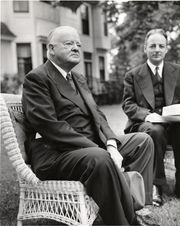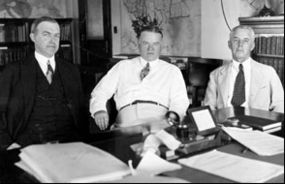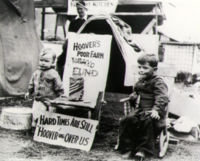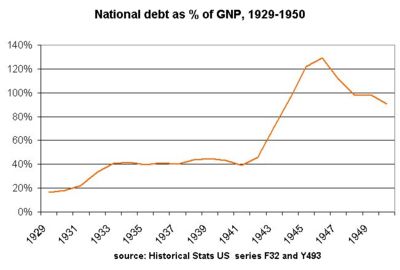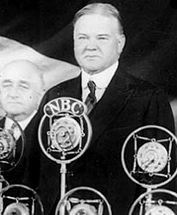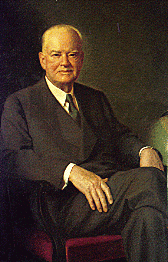Herbert Hoover
2007 Schools Wikipedia Selection. Related subjects: USA Presidents
| Herbert Clark Hoover | |
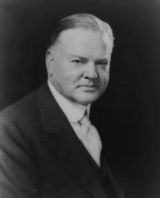 |
|
|
|
|
|---|---|
| In office March 4, 1929 – March 4, 1933 |
|
| Vice President(s) | Charles Curtis |
| Preceded by | Calvin Coolidge |
| Succeeded by | Franklin D. Roosevelt |
|
|
|
| Born | August 10, 1874 West Branch, IA |
| Died | October 20, 1964 New York City, New York |
| Political party | Republican |
| Spouse | Lou Henry Hoover |
| Religion | Quaker |
| Signature | |
Herbert Clark Hoover ( August 10, 1874 – October 20, 1964), the 31st President of the United States (1929-1933), was a successful mining engineer, and administrator. He showed the Efficiency Movement component of the Progressive Era, arguing there were other solutions to all social and economic problems—a position that was challenged by the Great Depression that began while he was President.
Family background
Hoover (whose family's name was originally Huber) was born into a Quaker family of distant German (Pfautz, Wehmeyer) and Swiss (Huber, Burkhart) descent, in West Branch, Iowa. He was the first President to be born west of the Mississippi River. Both of his parents, Jesse Hoover and Hulda Minthorn, died when Hoover was young. His father died in 1880 and his mother in 1883.
In 1885, eleven-year-old "Bert" Hoover went to Newberg, Oregon to become the ((( head leader over ) ??? ) *** WIKI EDITOR *** - this makes no sense.) his uncle John Minthorn, a doctor and real estate developer whom Hoover recalled as "a severe man on the surface, but like all Quakers kindly at the bottom."
At a young age, Hoover was self-kept and goalgetting. "My boyhood ambition was to be able to earn my own living, without the help of anybody, anywhere" he once said. As an office boy in his uncle's Oregon Land Company he mastered bookkeeping and typing, while also went to business school in the afternoon. Thanks to a local schoolteacher, Miss Jane Gray, the boy's eyes were opened to the novels of Charles Dickens and Sir Walter Scott. David Copperfield, the story of another orphan cast into the world, remained a lifelong favorite.
Mining Engineer
In August and September 1905 Herbert Hoover visited the mines at Broken Hill, NSW Australia, to judge the activity to extract zinc from tailings left after the concentrating process had taken a lead and silver concentrate. Miles of tailings dumps had added up for the lack of a treatment process to extract the zinc. Hoover, through his workers Bewick, Moreing and Company, had been sent by the embryonic "Collins House" group of entrepreneurs and financiers. Judging that the on going technology of froth floatation, froth floatation process would be able to treat the zinc tailings Hoover acted to make contracts with the leading mines at Broken Hill to buy their tailings. Those contracts was then transferred to the Zinc Corporation which was floated in October 1908 in London and Melbourne. Hoover became a director of the Zinc Corporation at its foundation.
Herbert Hoover was also the mining engineer at the Prince of Wales Mine, Gundagai in around 1900.. He was also hired in London to be a company representative at various gold mines in Western Australia. In 1902 Hoover travelled to Big Bell, Cue, Menzies and Coolgardie.
Humanitarian
Bored with making money, the Quaker side of Hoover was very anxious to be of service to others. When World War I started in August 1914, he helped get together the return home of 120,000 American tourists and businessmen from Europe. Hoover led five hundred volunteers to pass out food, clothing, steamship tickets and cash. "I did not realize it at the moment, but on August 3, 1914 my career was over forever. I was on the slippery road of public life." The difference between dictatorship and democracy, Hoover liked to say, was simple: dictators organize from the top down, democracies from the bottom up.
Belgium faced a food crisis after being invaded by Germany in fall 1914. Hoover undertook an unprecedented relief effort as head of the Committee for Relief in Belgium (CRB). The CRB became, in effect, an independent republic of relief, with its own flag, navy, factories, mills and railroads. Its $11-million-a-month budget was supplied by voluntary donations and government grants. In an early form of shuttle diplomacy, he crossed the North Sea forty times seeking to persuade the enemies in Berlin to allow food to reach the war's victims. Long before the Armistice of 1918, he was an international hero. The Belgian city of Leuven named a prominent square after him. In addition, the Finns added the word hoover, meaning "to help," to their language in honour of his two years of humanitarian work.
After the United States entered the war in April 1917, President Woodrow Wilson appointed Hoover head of the American Food Administration, with headquarters in Washington, D.C. He succeeded in cutting consumption of food needed overseas and avoided rationing at home. After the end of the war, Hoover, a member of the Supreme Economic Council and head of the American Relief Administration, organized shipments of food for millions of starving people in Central Europe. To this end, he employed a newly formed Quaker organization, the American Friends Service Committee to carry out much of the logistical work in Europe. He extended aid to famine-stricken Bolshevist Russia in 1921. When a critic inquired if he was not thus helping Bolshevism, Hoover retorted, "Twenty million people are starving. Whatever their politics, they shall be fed!"
During this time, Hoover realized that he was in a unique position to collect information about the Great War and its aftermath. In 1919, he pledged US$50,000 to Stanford University to support his Hoover War Collection and donated to the University the extensive files of the Commission for Relief in Belgium, the U.S. Food Administration, and the American Relief Administration. Scholars were sent to Europe to collect pamphlets, society publications, government documents, newspapers, posters, proclamations, and other ephemeral materials related to the war and the revolutions and political movements that had followed it. The collection was later renamed the Hoover War Library and is now known as the Hoover Institution.
Commerce Secretary
Hoover was touted as a possible Democratic Party presidential candidate in 1920, but he announced his support for Warren G. Harding, and in 1921, Hoover became Secretary of Commerce. As Secretary of Commerce, Hoover became one of the most visible men in the country, often overshadowing Presidents Harding and Calvin Coolidge. As secretary and as President, Hoover revolutionized the relations between business and government. Rejecting the adversarial stance of Roosevelt, Taft, and Wilson, he sought to make the Commerce Department a powerful service organization, empowered to forge cooperative voluntary partnerships between government and business. This philosophy is often called "associationalism."
Many of Hoover's efforts as Commerce Secretary centered on the elimination of waste and the increase of efficiency in business and industry. This included such things as reducing labor losses from trade disputes and seasonal fluctuations, reducing industrial losses from accident and injury, and reducing the amount of crude oil spilled during extraction and shipping. One major achievement was to promote progressive ideals in the areas of standardization products and designs. He energetically promoted international trade by opening offices overseas that gave advice and practical help to businessmen. He was especially eager to promote Hollywood films overseas. [Hart 1998] His "Own Your Own Home" campaign was a collaboration with organizations working to promote ownership of single-family dwellings, including the Better Houses in America movement, the Architects' Small House Service Bureau, and the Home Modernizing Bureau. He worked with bankers and the savings and loan industry to promote the new long term home mortgage, which dramatically stimulated home construction.
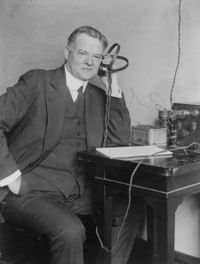
Among Hoover's other successes were the radio conferences, which played a key role in the early organization, development and regulation of radio broadcasting. Hoover played a key role in major projects for navigation, irrigation of dry lands, electrical power, and flood control. As the new air transport industry developed, Hoover held a conference on aviation to promote codes and regulations. He became president of the American Child Health Organization, and he raised private funds to promote health education in schools and communities.
In the spring of 1927, the Great Mississippi Flood of 1927 broke the banks and levees of the Mississippi River. The governors of six states along the Mississippi asked for Herbert Hoover in the emergency, so President Coolidge sent Hoover to mobilize state and local authorities, militia, army engineers, Coast Guard, and the American Red Cross. He set up health units, with a grant from the Rockefeller Foundation, to work in the flooded regions for a year. These workers stamped out malaria, pellagra and typhoid fever from many areas. His work during the flood brought Herbert Hoover to the front page of newspapers almost everywhere.
Election of 1928
In 1928, when President Coolidge declined to run for a second term of office, Herbert Hoover became the leading Republican candidate. Hoover’s reputation, experience, and public popularity coalesced to give him the nomination. He campaigned against Al Smith on the basis of efficiency and prosperity. Although Smith was the target of anti-Catholicism from the Baptist and Lutheran communities, Hoover avoided the religious issue. (Quakers were themselves under attack as pacifists.) He supported prohibition tentatively (calling it a "noble experiment"). Historians agree that Hoover's national reputation and the booming economy, combined with the deep splits in the Democratic party over religion and prohibition, guaranteed his landslide victory.
On poverty he promised: "We in America today are nearer to the final triumph over poverty than ever before in the history of any land." Within months, the Stock Market Crash of 1929 occurred, and the nation's economy spiraled downward into what became known as the Great Depression.
Presidency 1929-1933
Policies
Even if the Hoover presidency has a negative imprint on it, it must be noted that there were some important reforms under the Hoover administration.
The President expanded civil service coverage, cancelled private oil leases on government lands and led the way for the prosecution of gangster Al Capone. He appointed a commission which set aside 3 million acres (12,000 km²) of national parks and 2.3 million acres (9,000 km²) of national forests; advocated tax reduction for low-income Americans (not enacted); doubled the numbers of veteran hospital facilities; negotiated a treaty on St. Lawrence Seaway (which failed in the U.S. Senate); wrote a Children's Charter that advocated protection of every child regardless of race or gender; built the San Francisco Bay Bridge; created an antitrust division in the Justice Department; required air mail carriers to improve service; proposed federal loans for urban slum clearances (not enacted); organized the Federal Bureau of Prisons; reorganized the Bureau of Indian Affairs; proposed a federal Department of Education (not enacted); advocated fifty-dollar-per-month pensions for Americans over 65 (not enacted); chaired White House conferences on child health, protection, homebuilding and homeownership; and signed the Norris-La Guardia Act that limited judicial intervention in labor disputes.
Hoover's humanitarian and Quaker reputation—along with a Native American vice president—gave special meaning to his Indian policies. His Quaker upbringing influenced his views that Native Americans needed to achieve economic self-sufficiency. As President, he appointed Charles J. Rhoads as commissioner of Indian affairs. Hoover supported Rhoads' commitment to Indian assimilation and sought to minimize the federal role in Indian affairs. His goal was to have Indians acting as individuals (not as tribes) and assume the responsibilities of citizenship which had been granted with the Indian Citizenship Act of 1924.
In the foreign arena, Hoover began formulating what would later become Roosevelt's Good Neighbour policy by withdrawing American troops from Nicaragua and Haiti; he also proposed an arms embargo on Latin America and a one-third reduction of the world's naval power, which was called the Hoover Plan. The Roosevelt Corollary ceased being part of U.S. foreign policy. He and Secretary of State Henry Stimson outlined the Hoover-Stimson Doctrine that said the United States would not recognize territories gained by force.
Great Depression
The economy was put to the test with the onset of the Great Depression in the United States in 1929. It is not accurate, as was routinely claimed by his Democratic opponents, that Hoover "did nothing" in the face of the crisis, nor that he was a believer in laissez-faire policies. He explicitly denounced laissez-faire in his 1922 book American Individualism, took an active pro-regulation stance as Commerce Secretary, and saw tariff and agricultural support bills through Congress. In his memoirs he recalled his rejection of Treasury Secretary Mellon's suggested "leave-it-alone" approach. However, Hoover opposed direct relief from the federal government, seeking instead to organize voluntary measures and encourage state and local government responses. Except for accelerating public works expenditures, Hoover largely shunned legislative relief proposals until late in his term. While his efforts were small in comparison to that of the Roosevelt administration, they exceeded that of any federal administration before him.
Soon after the stock market crash, Hoover summoned industrialists to the White House and secured promises to maintain wages. Henry Ford even agreed to increase workers' daily pay from six to seven dollars. From the nation's utilities, Hoover won commitments of $1.8 billion in new construction and repairs for 1930. Railroad executives made a similar pledge. Organized labor agreed to withdraw its latest wage demands. The President ordered federal departments to speed up construction projects. He contacted all forty-eight state governors to make a similar appeal for expanded public works. He went to Congress with a $160 million tax cut, coupled with a doubling of resources for public buildings and dams, highways and harbors. He appointed a Federal Farm Board that tried to raise farm prices.
Praise for the President's intervention was widespread. "No one in his place could have done more," concluded the New York Times in the spring of 1930. "Very few of his predecessors could have done as much." In February, Hoover announced—prematurely—that the preliminary shock had passed and that employment was on the mend.
Together government and business actually spent more in the first half of 1930 than the previous year. Yet frightened consumers cut back their expenditures by ten percent. A severe drought ravaged the agricultural heartland beginning in the summer of 1930. The combination of these factors caused a downward spiral, as earning fell, smaller banks collapsed, and mortgages went unpaid. Hoover's hold-the-line policy in wages lasted little more than a year. Unemployment soared from five million in 1930 to over eleven million in 1931. A sharp recession had become the Great Depression.
In 1930, Hoover signed the Smoot-Hawley Tariff Act, which raised tariffs on over 20,000 dutiable items, despite the protests of economists. Major trading partners, like Canada, immediately retaliated. The tariff, combined with the 1932 Revenue Act, which hiked taxes and fees across the board, is often blamed for deepening the depression, and are considered by some to be Hoover's biggest political blunders. Moreover, the Federal Reserve System's tightening of the money supply (for fear of inflation) is regarded by Milton Friedman and most modern economists as a mistaken strategy, given the situation. Hoover's stance on the economy was based on volunteerism. From before his entry to the presidency, he was among the greatest proponents of the concept that public-private cooperation was the way to achieve high long-term growth. Hoover feared that too much intervention or coercion by the government would destroy individuality and self-reliance, which he considered to be important American values. Though he was not averse to taking action which he considered was in the public good, such as regulating radio broadcasting and aviation, he preferred a voluntary, non-government approach.
In June 1931, to deal with a very serious banking collapse in Vienna that threatened to cause a worldwide financial meltdown, Hoover issued the Hoover Moratorium that called for a one-year halt in reparations payments by Germany to France and in the payment of Allied war debts to the United States. The Hoover Moratorium had the effect of temporarily stopping the banking collapse in Europe. In June 1932, a conference canceled all reparations payments by Germany.
The following is an outline of other actions Hoover took to try to help end the Depression through government taxing and spending:
- Signed the Emergency Relief and Construction Act, the nation's first Federal unemployment assistance.
- Increased public works spending. Some of Hoover's efforts to stimulate the economy through public works are as follows:
- Asked Congress for a $400 million increase in the Federal Building Program
- Directed the Department of Commerce to establish a Division of Public Construction in December 1929
- Increased subsidies for ship construction through the Federal Shipping Board
- Urged the state governors to also increase their public works spending, though many failed to take any action.
- Signed the Federal Home Loan Bank Act establishing the Federal Home Loan Bank system to assist citizens in obtaining financing to purchase a home.
- Increased subsidies to the nation's struggling farmers with the Agricultural Marketing Act; but with only limited impact.
- Established the President's Emergency Relief Organization to coordinate local private relief efforts resulting in over 3,000 relief committees across the U.S.
- Authorized the repatriation to Mexico of 1-2 million people living in barrios throughout California, Texas and Michigan, 60% of whom were U.S. citizens of Mexican-descent, in an effort to ease unemployment.
- Urged bankers to form the National Credit Corporation to assist banks in financial trouble and protect depositors' money.
- Actively encouraged businesses to maintain high wages during the Depression, in line with the philosophy, called Fordism, that high wages create prosperity. Most corporations maintained their workers' wages early in the Depression in the hope that more money into the pockets of consumers would end the economic downturn.
- Signed the Reconstruction Finance Act. This act established the Reconstruction Finance Corporation, which made loans to the states for public works and unemployment relief. In addition, the corporation made loans to banks, railroads and agriculture credit organizations.
- Raised tariffs. After hearings held by the House Ways and Means Committee generated more than 20,000 pages of testimony regarding tariff protection, Congress responded with legislation that Hoover signed despite some misgivings. Instead of protecting American jobs, the Smoot-Hawley tariff is widely blamed for setting off a worldwide trade war which only worsened the country's (and the world's) economic ills.
Economy
In order to pay for these and other government programs, Hoover agreed to one of the largest tax increases in American history. The Revenue Act of 1932 raised income tax on the highest incomes from 25% to 63%. The estate tax was doubled and corporate taxes were raised by almost 15%. Also, a "check tax" was included that placed a 2-cent tax (over 30 cents in today's dollars) on all bank checks. Economists William D. Lastrapes and George Selgin,, conclude that the check tax was "an important contributing factor to that period's severe monetary contraction." Hoover also encouraged Congress to investigate the New York Stock Exchange, and this pressure resulted in various reforms.
For this reason, years later libertarians argued that Hoover's economics were statist. Franklin D. Roosevelt blasted the Republican incumbent for spending and taxing too much, increasing national debt, raising tariffs and blocking trade, as well as placing millions on the dole of the government. Roosevelt attacked Hoover for "reckless and extravagant" spending, of thinking "that we ought to centre control of everything in Washington as rapidly as possible," and of leading "the greatest spending administration in peacetime in all of history." Roosevelt's running mate, John Nance Garner, accused the Republican of "leading the country down the path of socialism".
These policies pale beside the more drastic steps taken later as part of the New Deal. Hoover's opponents charge that his policies came too little, and too late, and did not work. Even as he asked Congress for legislation, he reiterated his view that while people must not suffer from hunger and cold, caring for them must be primarily a local and voluntary responsibility.
Even so, New Dealer Rexford Tugwell later remarked that although no one would say so at the time, "practically the whole New Deal was extrapolated from programs that Hoover started."
Unemployment rose to 24.9% by the end of Hoover's presidency in 1933, at the depth of the Great Depression.
1932 campaign
Hoover was nominated by the Republicans for a second term. In his nine major radio addresses Hoover primarily defended his administration and his philosophy. He realized he would lose. The apologia approach did not allow Hoover to refute Franklin Roosevelt's charge that he was personally responsible for the depression.
Bonus Army
Thousands of World War I veterans and their families demonstrated and camped out in Washington, D.C., during June 1932, calling for immediate payment of a bonus that had been promised by the Adjusted Service Certificate Law for payment in 1924. Although offered money by Congress to return home, some members of the " Bonus army" remained. Washington police attempted to remove the demonstrators from their camp, but they were unsuccessful and the conflict grew. Hoover sent U.S. Army forces led by General Douglas MacArthur and aided by junior officers Dwight D. Eisenhower and George S. Patton to stop a march. MacArthur, believing he was fighting a communist revolution, chose to clear out the camp with military force. In the ensuing clash, hundreds of civilians were injured and several were killed. The incident was another negative for Hoover in the 1932 election.
Administration and Cabinet
| OFFICE | NAME | TERM | ||||
| President | Herbert Hoover | 1929–1933 | ||||
| Vice President | Charles Curtis | 1929–1933 | ||||
| Secretary of State | Henry L. Stimson | 1929–1933 | ||||
| Secretary of the Treasury | Andrew Mellon | 1929–1932 | ||||
| Ogden L. Mills | 1932–1933 | |||||
| Secretary of War | James W. Good | 1929 | ||||
| Patrick J. Hurley | 1929–1933 | |||||
| Attorney General | William D. Mitchell | 1929–1933 | ||||
| Postmaster General | Walter F. Brown | 1929–1933 | ||||
| Secretary of the Navy | Charles F. Adams | 1929–1933 | ||||
| Secretary of the Interior | Ray L. Wilbur | 1929–1933 | ||||
| Secretary of Agriculture | Arthur M. Hyde | 1929–1933 | ||||
| Secretary of Commerce | Robert P. Lamont | 1929–1932 | ||||
| Roy D. Chapin | 1932–1933 | |||||
| Secretary of Labor | James J. Davis | 1929–1930 | ||||
| William N. Doak | 1930–1933 | |||||
Supreme Court appointments
Hoover appointed the following Justices to the Supreme Court of the United States:
- Charles Evans Hughes ( Chief Justice) – 1930
- Owen Josephus Roberts – 1930
- Benjamin Nathan Cardozo – 1932
Post World War II
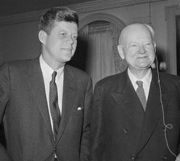
Based on Hoover's previous experience with Germany at the end of World War I, in the winter of 1946 - 47 President Harry S. Truman selected Hoover to tour Germany in order to ascertain the food status of the occupied nation. Hoover toured what was to become West Germany in Field Marshall Herman Goering's old train coach and produced a number of reports sharply critical of U.S. occupation policy. The economy of Germany had "sunk to the lowest level in a hundred years". As the Cold War deepened, Hoover expressed reservations about some of the activities of the American Friends Service Committee, which he previously had strongly supported.
On Hoover’s initiative, a school meals program in the U.S. and British occupation zones of Germany was begun on 14 April 1947. The program served 3.5 million children ages 6 through 18. A total of 40,000 tons of American food was made available during the Hooverspeisung (Hoover meals).
In 1947, President Harry S. Truman appointed Hoover to a commission, which elected him chairman, to reorganize the executive departments. This became known as the Hoover Commission. He was appointed chairman of a similar commission by President Dwight D. Eisenhower in 1953. Both found numerous inefficiencies and ways to reduce waste.
In 1949, New York Governor Thomas E. Dewey offered Hoover the Senate seat vacated by Herbert Lehman. The former President declined, and the seat went to John Foster Dulles.
Hoover died at the age of 90 in New York City at 11:35 a.m. on October 20, 1964, 31 years and seven months after leaving office. He had outlived his wife by 20 years. By the time of his death, he had rehabilitated his image. He had the longest retirement of any President. (Gerald Ford as of 2006 has been out of office for 29 years). Hoover and his wife are buried at the Herbert Hoover Presidential Library and Museum in West Branch, Iowa. Hoover was honored with a state funeral, and it was America's third in a span of 12 months following John F. Kennedy and Douglas MacArthur.
Heritage and memorials
The Lou Henry and Herbert Hoover House, built in 1919 in Palo Alto, California, is now the official residence of the president of Stanford University, and a National Historic Landmark. Hoover's rustic rural presidential retreat, Rapidan Camp (also later known as Camp Hoover) in the Shenandoah National Park in Virginia, has recently been restored and opened to the public. The Hoover Dam was also named in his honour.
Quotes
- "True American Liberalism utterly denies the whole creed of socialism." The Challenge to Liberty, pg 57.
- "A chicken in every pot and a car in every garage" - Presidential Campaign Slogan 1928
- "I outlived the bastards" - answer to a question of how he managed to survive the long ostracism under the Roosevelt administration. (Hoover also outlived every member of his own Cabinet, as well as the Harding and Coolidge Cabinets).
- "Once upon a time my political opponents honored me as possessing the fabulous intellectual and economic power by which I created a worldwide depression all by myself."
- "Older men declare war. But it is the youth that must fight and die."
- "There are only two occasions when Americans respect privacy, especially in Presidents. Those are prayer and fishing."
- "Wisdom oft times consists of knowing what to do next"
- "Democracy is a harsh employer." - Comment to a former secretary in 1936.
- "The only trouble with capitalism is capitalists - they are too damn greedy."
- "Forget this 'Great Depression' let's all go to Europe!"
Trivia
- There is a square in downtown Leuven, Belgium, that is named after Hoover (Herbert Hooverplein). Along with the famous Ladeuzeplein where the Central Universitair Library is located, Herbert Hooverplein serves as the location of Leuven's famous yearly September Kermis and December Christmas Market.
